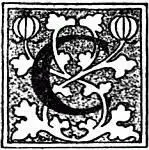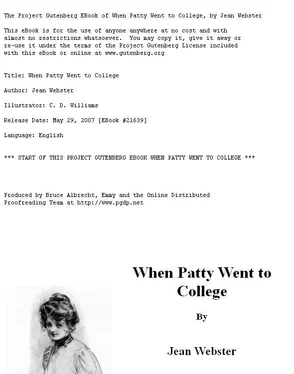Jean Webster - When Patty Went to College
Здесь есть возможность читать онлайн «Jean Webster - When Patty Went to College» весь текст электронной книги совершенно бесплатно (целиком полную версию без сокращений). В некоторых случаях можно слушать аудио, скачать через торрент в формате fb2 и присутствует краткое содержание. Год выпуска: 2007, Жанр: Классическая проза, на английском языке. Описание произведения, (предисловие) а так же отзывы посетителей доступны на портале библиотеки ЛибКат.
- Название:When Patty Went to College
- Автор:
- Жанр:
- Год:2007
- ISBN:нет данных
- Рейтинг книги:4 / 5. Голосов: 1
-
Избранное:Добавить в избранное
- Отзывы:
-
Ваша оценка:
- 80
- 1
- 2
- 3
- 4
- 5
When Patty Went to College: краткое содержание, описание и аннотация
Предлагаем к чтению аннотацию, описание, краткое содержание или предисловие (зависит от того, что написал сам автор книги «When Patty Went to College»). Если вы не нашли необходимую информацию о книге — напишите в комментариях, мы постараемся отыскать её.
When Patty Went to College — читать онлайн бесплатно полную книгу (весь текст) целиком
Ниже представлен текст книги, разбитый по страницам. Система сохранения места последней прочитанной страницы, позволяет с удобством читать онлайн бесплатно книгу «When Patty Went to College», без необходимости каждый раз заново искать на чём Вы остановились. Поставьте закладку, и сможете в любой момент перейти на страницу, на которой закончили чтение.
Интервал:
Закладка:
"Oh, yes," said Patty; "they have to. I've known some of the brightest girls in college to be dropped."
Lady Clara groaned. "I'm awfully shaky in geometry, Patty. Do they flunk many girls in that?"
"Many!" said Patty. "The mere clerical labor of writing out the notes occupies the department two days."
"Is the examination terribly hard?"
"I don't remember much about it. It's been such a long time since I was a freshman, you see. They picked out the hardest theorems, I know—things you couldn't even draw, let alone demonstrate: the pyramid that's cut in slices, for one,—I don't remember its name,—and that sprawling one that looks like a snail crawling out of its shell: the devil's coffin, I believe it's called technically. And—oh, yes! they give you originals— frightful originals, like nothing you've ever had before; and they put a little note at the top of the page telling you to do them first, and you get so muddled trying to think fast that you can't think at all. I know a girl who spent all the two hours trying to think out an original, and just as she got ready to write it down the bell rang and she had to hand in her paper."
"And what happened?"
"Oh, she flunked. You couldn't really blame the instructor, you know, for not reading between the lines, for there weren't any lines to read between; but it was sort of a pity, for the girl really knew an awful lot—but she couldn't express it."
"That's just like me."
"Ah, it's like a good many people." A silence ensued, and the freshmen looked at one another dejectedly. "But you can live, even if you should flunk math," Patty continued reassuringly. "Other people have done it before you."
"If it were only geometry—but we're scared over Latin."
"Oh, Latin! There's no use studying for that, for you can't possibly read it all over, and if you just pick out a part, it's sure not to be the same part they pick out. The best way is to say incantations over the book, and open it with your eyes blindfolded, and study the page it opens to; then, in case you don't pass,—and you probably won't,—you can throw the blame on fate. My freshman year, if I remember right, they gave us for prose composition one of Emerson's essays to translate into Latin, and we couldn't even tell what it meant in English."
The three looked at one another again.
"I couldn't do anything like that."
"Nor I."
"Nor I."
"Nor any one else," said Patty.
"We can flunk Latin and math; but if we flunk any more we're gone."
"I believe so," said Patty.
"And I'm awfully shaky in German."
"And I in French."
"And I in Greek."
"I don't know anything about German," said Patty. "Never had it myself. But I remember hearing Priscilla say that the printed examination papers didn't come but in time, and Fräulein Scherin, who writes a frightful hand, wrote the questions on the board in German script, and they couldn't even read them. In French I believe the first question was to write out the 'Marseillaise'; there are seven verses, and no one had learned them, and the 'Marseillaise,' you know, is a thing that you simply can't make up on the spur of the moment. As for Greek, I told you my own experience; I am sure nothing could be worse than that."
The freshmen looked at one another hopelessly. "There's only English and hygiene and Bible history left."
"English is something you can't tell anything about," said Patty. "They're as likely as not to ask you to write a heroic poem in iambic pentameters, if you know what they are. You have to depend on inspiration; you can't study for it."
"I hope," sighed Lady Clara, "to get through hygiene and Bible history, though, as they only count one hour apiece, I suppose it isn't much."
"You mustn't be too sanguine," said Patty. "It all depends on chance. The class in hygiene is so big that the professor hasn't time to read the papers; he just goes down the list and flunks every thirteenth girl. I'm not sure about Bible history, but I think he does the same, because I know, freshman year, that I made a mistake and handed in my map of the Holy Lands done in colored chalk to the hygiene professor, and my chart of the digestive system to the Bible professor, and neither of them noticed it. They did look a good deal alike, but not so much but what you could tell them apart. All I have to say is that I hope none of you will be number thirteen."
The freshmen stared at one another in speechless horror, and Patty rose. "Well, good-by, my children, and, above all things, don't worry. I'm glad if I've been able to cheer you up a little, for so much depends on not being nervous. Don't believe any of the silly stories the sophomores tell," she called back over her shoulder; "they're just trying to frighten you."
X
"Per l'Italia"

OLLEGE is a more or less selfish place. Everybody is so busy with her own affairs that she has no time to give to her neighbor, unless her neighbor has something to give in return. Olivia Copeland apparently had nothing to give in return. She was quiet and inconspicuous, and it took a second glance to realize that her face was striking and that there was a look in her eyes that other freshmen did not have. By an unfelicitous chance she was placed in the same study with Lady Clara Vere de Vere and Emily Washburn. They thought her foreign and queer, and she thought them crude and boisterous, and after the first week or two of politely trying to get acquainted the effort was dropped on both sides.
The year wore on, and nobody knew, or at least no one paid any attention to the fact, that Olivia Copeland was homesick and unhappy. Her room-mates thought that they had done their duty when they occasionally asked her to play golf or go skating with them (an invitation they were very safe in giving, as she knew how to do neither). Her instructors thought that they had done their duty when they called her up to the desk after class and warned her that her work was not as good as it had been, and that if she wished to pass she must improve in it.
The English class was the only one in which she was not warned; but she had no means of knowing that her themes were handed about among the different instructors and that she was referred to in the department as "that remarkable Miss Copeland." The department had a theory that if they let a girl know she was doing good work she would immediately stop and rest upon her reputation; and Olivia, in consequence, did not discover that she was remarkable. She merely discovered that she was miserable and out of place, and she continued to drip tears of homesickness before a sketch of an Italian villa that hung above her desk.
It was Patty Wyatt who first discovered her. Patty had dropped into the freshmen's room one afternoon on some errand or other (probably to borrow alcohol), and had idly picked up a pile of English themes that were lying on the study table.
"Whose are these? Do you care if I look at them?" she asked.
"No; you can read them if you want to," said Lady Clara. "They're Olivia's, but she won't mind."
Patty carelessly turned the pages, and then, as a title caught her eye, she suddenly looked up with a show of interest. "'The Coral-fishers of Capri'! What on earth does Olivia Copeland know about the coral-fishers of Capri?"
"Oh, she lives somewhere near there—at Sorrento," said Lady Clara, indifferently.
"Olivia Copeland lives at Sorrento!" Patty stared. "Why didn't you tell me?"
"I supposed you knew it. Her father's an artist or something of the sort. She's lived in Italy all her life; that's what makes her so queer."
Читать дальшеИнтервал:
Закладка:
Похожие книги на «When Patty Went to College»
Представляем Вашему вниманию похожие книги на «When Patty Went to College» списком для выбора. Мы отобрали схожую по названию и смыслу литературу в надежде предоставить читателям больше вариантов отыскать новые, интересные, ещё непрочитанные произведения.
Обсуждение, отзывы о книге «When Patty Went to College» и просто собственные мнения читателей. Оставьте ваши комментарии, напишите, что Вы думаете о произведении, его смысле или главных героях. Укажите что конкретно понравилось, а что нет, и почему Вы так считаете.












